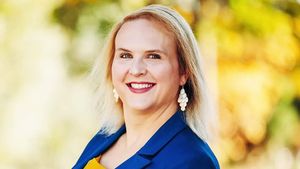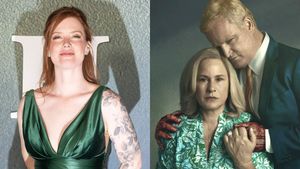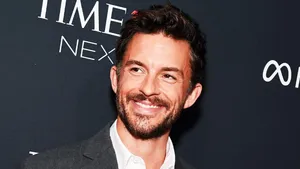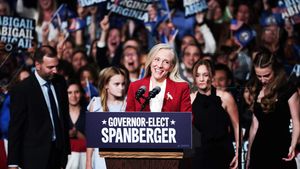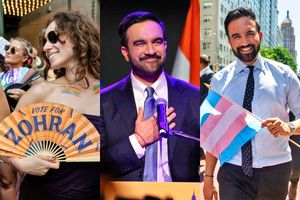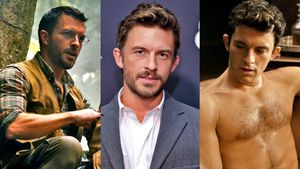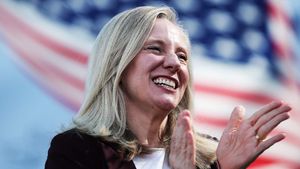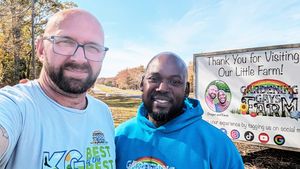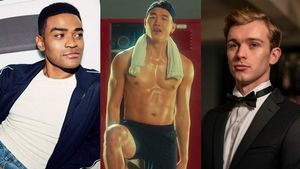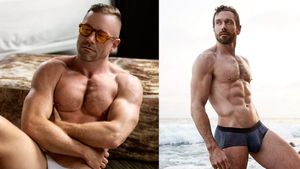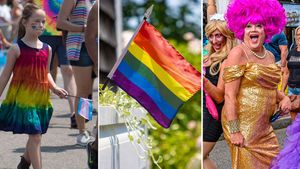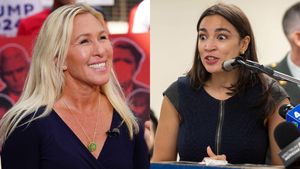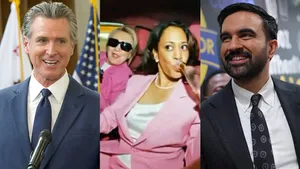
Treatment GuideJust DiagnosedSex & DatingAfrican AmericanStigmaAsk the HIV DocPrEP En EspañolNewsVoicesPrint IssueVideoOut 100
CONTACTCAREER OPPORTUNITIESADVERTISE WITH USPRIVACY POLICYPRIVACY PREFERENCESTERMS OF USELEGAL NOTICE
© 2025 Pride Publishing Inc.
All Rights reserved
All Rights reserved
By continuing to use our site, you agree to our Privacy Policy and Terms of Use.
There is no denying it. Homosexuality is officially 'in.' Queerness rocks! You can't read a newspaper, watch television or listen to the radio, or go to church without discovering there are gay men among us. There's Queer as Folk and Will & Grace. From reality television we have Boy Meets Boy, Gay Hollywood, and Queer Eye for the Straight Guy. And talking directly with America each day, Ellen is back. On the policy front, gay people can now get married in Canada, there are civil unions in California (along with divorce, yikes!), and conventional wisdom says the Massachusetts supreme court will rule in favor of gay marriage'or at least civil unions'in that state. On the religious front, Episcopalians have appointed their first openly gay bishop. In 1982, Gloria T. Hull, Patricia Bell Scott, and Barbara Smith published an anthology titled All the Women Are White, All the Blacks Are Men, but Some of Us Are Brave. It is about the nexus of feminism and Black Power and the invisibility and pressures on black feminists caused by a simplistic media view of the women's movement (where all the leaders were white) and the Black Power movement (where all the leaders were male). This perception was incorrect, harmful to each movement, and caused a tension between what should have been allied movements. Black gay men, particularly those of us living with HIV, experience these phenomena daily. Over the years an HIV 'code' has evolved: 'Gay' means white, and 'black' means women and children. This 'code' is exacerbated among blacks, where despite all the evidence to the contrary, 'HIV' or 'AIDS' still means white. The result is an invisibility and isolation that makes it difficult for black gay men to acknowledge risk, get tested, disclose HIV-positive status, or seek treatment. Despite all the 'advances' on gay and lesbian issues, recent polls show an erosion of public support for equal rights for gay and lesbian people. It appears this erosion is most acute among people of color and particularly among black Americans. Now, there has been a long-standing myth that blacks are more homophobic than whites. This myth is not borne out in the research and is certainly not borne out in my personal experience as an openly black gay man who works almost exclusively in black settings. So why'when every night millions of Americans are welcoming gay men into their homes via the television and the highest institutions in the land are taking a stand in support of equal rights for homosexuals'is this erosion happening? Maybe because in the face of the current economic climate, it is difficult to convince America that well-to-do white gay men are somehow doing any worse than anyone else. There are multiple problems with this scenario. First among them is that not all 'queer' people are white, gay, or well-to-do. Second, we should be striving for one America where everyone has equal access to the full privileges and responsibilities of our citizenship. But it is impossible for the vast majority of the populace to see this as long as the images of us are narrow and exclusionary. Furthermore, this narrow media depiction of gay/lesbian/bisexual/transgendered people (where there are no Ls, Bs, or Ts) renders the rest of us invisible and disconnected. This disconnection provides an excellent environment for the spread of disease and sickness. I'm glad there are new images in the media that acknowledge the existence of gay men. Believe it or not, I believe in incremental change. And I know we all benefit from a world that acknowledges diversity and celebrates the full spectrum of the human experience. It is critical to our efforts to end the AIDS pandemic. After all, we're all a little queer, one way or another. Wilson is the founding director of the Los Angeles'based Black AIDS Institute.
From our Sponsors
Most Popular
BREAKING: Supreme Court rules to save free access to preventive care, including PrEP
June 27 2025 10:32 AM
Thanks to U=U, HIV-positive people can live long, happy, healthy lives
July 25 2025 2:37 PM
The Talk: Beyond the exam room
August 13 2025 3:15 PM
Plus: Featured Video
Latest Stories
Amazing People of 2025: Javier Muñoz
October 17 2025 7:35 PM
It’s National PrEP Day! Learn the latest about HIV prevention
October 10 2025 9:00 AM
“I am the steward of my ship”: John Gibson rewrites his HIV narrative
September 16 2025 2:56 PM
“So much life to live”: Eric Nieves on thriving with HIV
September 03 2025 11:37 AM
The Talk: Owning your voice
August 25 2025 8:16 PM
The lab coat just got queer
August 21 2025 10:00 AM
Messenger RNA could be the key to an HIV vaccine — but government cuts pose a threat
August 20 2025 8:02 AM
The Talk: Navigating your treatment
August 01 2025 6:02 PM
The Talk: Starting the conversation
July 25 2025 4:47 PM
How the Black AIDS Institute continues to fill in the gaps
July 25 2025 1:06 PM
“I felt like a butterfly”: Niko Flowers on reclaiming life with HIV
July 23 2025 12:22 PM
Dancer. Healer. Survivor. DéShaun Armbrister is all of the above
July 02 2025 8:23 PM
1985: the year the AIDS crisis finally broke through the silence
June 26 2025 11:24 AM
VIDEO: A man living with HIV discusses his journey to fatherhood
June 10 2025 4:58 PM
Trump admin guts $258 million in funding for HIV vaccine research
June 03 2025 3:47 PM
Grindr is reminding us why jockstraps are so sexy and iconic
May 02 2025 5:36 PM
HRC holds 'die-in' to protest Trump health care cuts
April 28 2025 2:11 PM
Two right-wing Supreme Court justices signal they may uphold access to PrEP and more
April 21 2025 4:10 PM



























